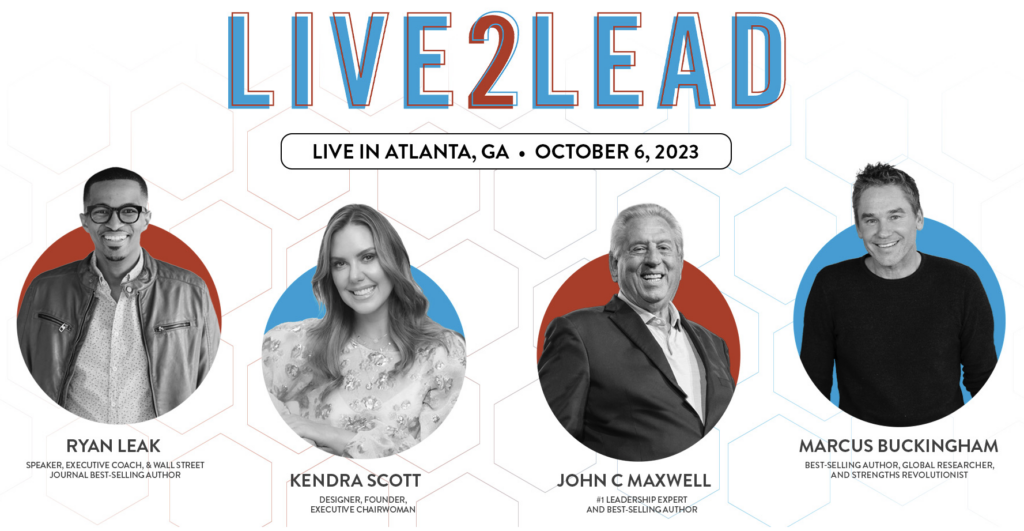Executive Podcast #257: Are You a Climber or a Connector?

Self-aware leaders prioritize their team’s well-being over their personal career advancement. These leaders are advocates for the individuals on their team, focusing on collaboration rather than extracting benefits from their team members.
Which kind of leader are you: a Climber, focused on advancing yourself, or a Connector, focused on the team and advancing them?
Do you have your tickets to Live2Lead? Use the code CLPODCAST at checkout to receive 10% off any tier ticket, plus an additional 10% off with General Admission ticket orders of 10 or more!
Download our Learning Guide for this podcast!
Perry Holley:
Welcome to the Maxwell Leadership Executive Podcast, where our goal is to help you increase your reputation as a leader, increase your ability to influence others, and increase your ability to fully engage your team to deliver remarkable results. Hi, I’m Perry Holly, a Maxwell leadership, facilitator and coach.
Chris Goede:
I’m Chris Goede, executive vice president with Maxwell leadership. Welcome and thank you for joining. As we get started, I’d love for you to visit MaxwellLeadership.com/Podcast, and there you can download our learner guide, or you can see our blog that Perry writes that’s tied to different content pieces, places for you to just receive content and add value to you. We’d love for you to visit that site. Well, today’s topic is titled are you a Climber or a Connector? I love this. I’m super excited about our conversation today.
Perry Holley:
Which are you?
Chris Goede:
I am a yes. Yes. I desire to climb, but I have a natural pull towards connecting with people.
Perry Holley:
You do.
Chris Goede:
This is a concept that John teaches where a climber who is someone that’s focused on advancing themselves and climbing up that ladder, and a connector is focused on the team and the connecting and advancing the team as a whole. And there’s a big difference between two.
Perry Holley:
I like what you just said, though. As a leader, you’re kind of naturally bent a little bit toward climbing. And climbing is not that bad, except if you’re not doing the other part.
Chris Goede:
Yes, that’s correct. That’s good.
Perry Holley:
So, self aware leaders, the idea here was that you put the team ahead of your own career advancement. But as we’re saying, your career advancement is important to you and that I do want to advance my career in leadership. I do want to climb the ladder in the organization. But you can tell leaders who are for their team and leaders that want something from their team. And we’re trying to connect with people. I think we’ve just shared that. I kind of go back and forth with you today about what are the characteristics of a climber versus what would be the difference of being a Connector and maybe give a couple of practical ideas around it’s okay to want to be advanced in your career, for sure. But are you doing it with the team or just for yourself?
Chris Goede:
Yeah, I love this. So the first thing that I want to jump into here is climbers, like I just mentioned, think vertically, right? Like up the ladder, where connectors think horizontally and kind of out with the team. So climbers are actually very aware of the pecking order. Right. They’re very aware of who’s ahead of them and the standings or the organization chart, whatever that might be. I love that we threw standings in there. We both love sports and competitive there. Connectors are focused on moving over to where the people are and helping them as a unit succeed and move forward. And so they put the good of the team ahead of their own personal game.
Perry Holley:
Yeah. And if you do that, if the team is growing and producing and that you get the vertical eventually there. But I think if you have the focus the other way, it gets problematic. Another characteristic that climbers focus on position where connectors focus on relationship. And this is pure five levels of leadership, level one versus level two. And leaders that focus on position value their own progress, they value their own advancement versus where the team is. They tend not find about level one leaders position. I have the title. I tend to focus on being the boss. And we just talked about that a few weeks ago versus being the leader. And so I think when you’re focusing on relationships, you now are moving your influence to another level. Your level one. Your position does give you a little influence. It comes with that. People follow you because they have to. But level two says, no, I’m going to build my influence through relationship with you. And now people follow me because they want to. How much better is that for the team?
Chris Goede:
Well, I love I’m going to do a little play on words here. When Perry was just talking about connectors focus on relationships, remember, connectors can focus on connecting. What I mean by that is we don’t necessarily oftentimes when we hear the word relationships, we think very time consuming. I got to basically bear everything in my soul. And that’s not what we’re talking about. Right. There are ways to connect with your team and your people in a way that’s not as we would sometimes feel like that is, quote unquote, a deep relationship. And so just sitting there listening to you thinking about that and a little bit of play on the words. So the next one is climbers value competition and connectors value cooperation. Now, this is a little bit of a challenge for me. I value both. Right? That’s why I said I do have some natural tendencies that go back and forth. But climbers can develop a win at all cost mindset. And Connectors choose instead to use their relationships to foster the cooperation of others. And they get the buy in from the team as they’re working through that.
Perry Holley:
Can you be competitive?
Chris Goede:
Yes.
Perry Holley:
Okay.
Chris Goede:
Because as I was talking about this, I was thinking, I was like, when you put into my notes when it all costs, I was like, no, I’m not there. I’m not stepping on people to climb a ladder. But I do want to be competitive. And I love being competitive in a team environment. So that kind of helps there. I feel better about talking about healthy.
Perry Holley:
Competition versus unhealthy competition. But yeah, that’s what went through my mind when you said that because you are competitive. But it’s very positive on our team. And even the way you present yourself, it’s not negative at all. It’s not like you’re trying to win at all costs. You’re trying to win, and you want us to win, but you want to win with the team.
Chris Goede:
That’s right. Yeah, that’s right. Thank you. I feel better.
Perry Holley:
Do you want to lay down?
Chris Goede:
Yeah, that’s right. Today’s a session for Chris leaders.
Maxwell Leadership Growth Plan Ad:
You know better than anyone that growth is essential if you want to make tomorrow better than today. But fitting growth into your calendar takes intentionality and self discipline. So let Maxwell Leadership help make your growth achievable. You’re invited to join thousands of worldwide leaders in using the Maxwell Leadership Growth Plan. The Maxwell Leadership Growth Plan provides you with convenient and easy to implement leadership resources, including video lessons from John Maxwell, all at your fingertips, available in our Maxwell Leadership app or online, you’ll be coached by many well known leadership experts that will help you achieve your growth goals. You can even listen to this podcast right there in the app. Check it out for free today at Growth.MaxwellLeadership.com. That’s Growth.MaxwellLeadership.com.
Perry Holley:
Another point of comparison that John brings up is climbers seek power. Connectors seek partnerships. And I love this idea about climbers really want power because it helps to climb the corporate ladder faster. But working alone, you’re not going to do really anything significant. I think of John talking about the law of significance, that one is too small a number to do anything of real value. But connectors seek partnership. They promote kind of high powered, highly engaged teams. They create these teams, they form partnerships up, down and across. So I’m thinking, again, almost 360 degree influence is that I’m partnering not only with the people above me, but my peers, the people on my team. And I do have a power dynamic, perhaps because I’m the boss, the leader, but I don’t play that power. I’m not trying to amass power for any reason other than to help my team and to really build that partnership.
Chris Goede:
I think partnerships are key when it comes to the progress as a team, as a unit, as an individual inside organizations. And again, to your point, one’s too small a number, and I would encourage all of us to think like that as we think about our influence and our KPIs as an organization. Also, climbers build their image. Connectors build consensus. We’ve all had this in organizations where we’re very aware of those that want people to be very aware of them and what they’re accomplishing and their image. Right? That tends to be a little bit more of a climbers mindset. They want to appear strong, in charge, or maybe even appear successful when maybe they’re not. It could be a false front, but connectors are more concerned with getting people on the team, everybody on the same page, and so they’ll figure out how to effectively work together. John talks about this in the law of the common ground, and part of the key, not even part of the main key of the common ground is making sure that you have that trust from your people. And so if you’re on this climbing side and you’re worried about your image, believe me, people can smell that out in a heartbeat and all of our detectors go off when we feel that. And you’re not going to get any trust with people around you versus if you think about it from a connection and building consensus, you’re going to get the trust from the team.
Perry Holley:
Yeah, I worked with a guy once, we were a successful team. But man, he would actually say, no, we’re not going to do that because it would make me look bad. And you think he was so worried about how he looked and even doing the right thing, he wasn’t going to put that image at risk to do that. Finally, last one. That climbers want to stand apart, but connectors want to stand together. And I think about climbers wanting to kind of distinguish themselves from everyone else. Look, in the organization, they want to create separation so that you can see me and I’m the one that’s going to make the climb. I’m the one that needs to if not the team, it’s me to do that. But connectors really find a way to get closer with the team that they build that nucleus of a team where they stand together, they win together, they lose together. I think the leader still stands out, but it doesn’t feel like that to a climber. They don’t see that as standing out. They see that as being too much in the group.
Chris Goede:
Yeah, well, let’s say that you’re listening to this and you go, man, Chris, I actually have kind of a tendency to go the other way than you do, where I’m just all about the climbing. You have good intentions behind it, but you can just tell from assessing where you’re at that you’re a climber. But then also let me talk to the other side, which is you say, no, I kind of naturally connected. There’s always ways to improve that as well. I think the art of connecting is key when it comes to influence. So Perry and I are going to kind of wrap up as we move towards the end of this episode. We’re going to talk just about a few ideas of how to become a world class connector. Here’s five things that you guys can really just think about as takeaways of how do you become a better connector, whether you are a connector already or whether you kind of have a bent towards climbing the ladder. Number one is to initiate. Don’t wait for people to come up to you, right? Initiate. Go out and about with the people on your team. Figure out, learn, serve them and engage that through initiation. The second one is to ask great questions, be curious. We just did a lesson on that. I would love for you to go back and listen that if you didn’t hear it, it was last week’s episode. And go back and learn about why is that a miracle skill? And so if you’ll initiate and you’ll ask great questions from a curious standpoint, that’s going to help you connect.
Perry Holley:
Number three was be interested and stop trying to be interesting. That’s a Dale Carnegie quote that I just really resonates with me. But leaders, a lot of times it’s so tempting to want others to be interested in you. You’re trying to be interesting. Instead be interested in others. Number four, we’ve talked about this quite a bit, but learn to listen. Actively giving people the gift of listening to them is the greatest way to show value and connect with people that want to be around people. People want to be around people who listen to them. They want to be heard, they want to be noticed. And number five, one of my favorite words is being teachable, is that people will connect with you if you go back to being curious. You mentioned that you’re trying to learn, you’re trying to grow. You’re teachable, you don’t have all the answers. You invite them to contribute in that. And that makes that consensus, that connection, that team play so much more important because we’re trying to learn from each other. Yeah.
Chris Goede:
One little add on there. When you talked about be teachable, one of the great connectors that I’m thinking about in my journey was extremely teachable, even at a different level that I was playing with. And what was awesome was they always came back and said, hey, remember we had this conversation and I learned this from you. This is what I did with that.
Perry Holley:
Oh, wow.
Chris Goede:
And I immediately just drew closer to that from a connection standpoint. And so I just wanted to add that in there. As we wrap up, let me leave you with one thought. I want to challenge you in the fact that if you will become a better connector, you’ll climb the ladder faster.
Perry Holley:
I agree.
Chris Goede:
Right now, listen, if you want to climb the ladder fast and you don’t connect, I guarantee you there’s a group of people down there at the bottom that are going to yank that ladder right out from underneath.
Perry Holley:
That’s what John said. You’re not going to be successful unless a lot of people want you to be.
Chris Goede:
So, man, figure out how to be a great connector. And by the way, as a team and as a unit, you guys will climb fantastic well.
Perry Holley:
Thank you, Chris. It’s a reminder if you’d like the learner guide for this episode, if you want to learn about our offerings, see the other podcast in our podcast family or just leave us a comment or a question. You can do all that at MaxwellLeadership.com/Podcast. We love hearing from you. Very grateful you’d spend this time with us. That’s all today from the Maxwell Leadership executive podcast.
To be a Successful Leader, You Need Feedback on Your Leadership.
We’re excited to announce our new and improved Organizational Effectiveness Survey (OES). The OES gathers feedback from employees to give leaders and management the knowledge and action plans needed to develop a more effective and productive work environment. Our new version measures 4 areas of your business: Leadership, People, Strategy, and Performance.














Be the first to comment on "Executive Podcast #257: Are You a Climber or a Connector?"